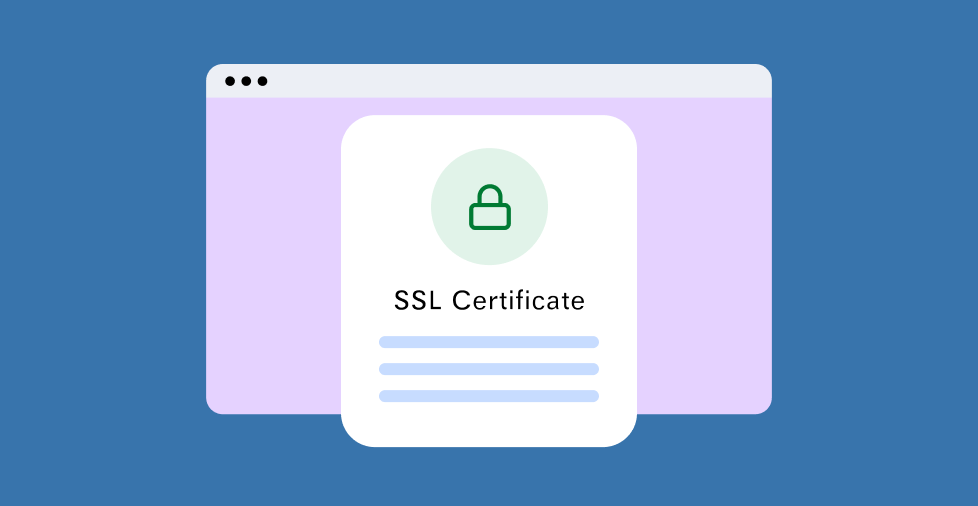Key takeaways:
- SSL warranties protect end-users from financial loss only if a Certificate Authority (CA) mis-issues an SSL certificate, not from all cyberattacks or website vulnerabilities.
- The warranty amount is included in the price of the SSL certificate and scales with its validation level (DV, OV, EV), with higher-level certificates offering greater
coverage. - Beyond financial safeguards, SSL warranties enhance customer trust and can help businesses meet regulatory compliance for data security.
Even if your site uses an SSL certificate, it doesn’t cover every risk. A mis-issued certificate, not caused by your business, could still lead to a data breach and damage your reputation.
With cyberattacks becoming more sophisticated, installing an SSL certificate isn’t always enough. Although it encrypts and secures data, unforeseen issues still persist. A digital certificate may be invalidated if the issuing certificate authority (CA) experiences a security breach or operational failure. When this happens, an SSL certificate warranty enters the picture.
What is an SSL certificate warranty?
An SSL certificate warranty is an insurance or benefit provided by the CA whenever a digital certificate fails. It offers a level of protection for the end-user (not the website owner) against financial losses that might occur if the CA makes a mistake in the issuance of an SSL certificate.
A CA is a trusted organization that issues and verifies SSL certificates. These certificates help secure communication between a website and its visitors.
Most of the time, CAs follow strict rules to make sure certificates are issued correctly. But mistakes can happen. For example, a CA might accidentally issue a certificate to the wrong person or organization.
If that error leads to financial loss such as someone impersonating your website, the SSL certificate warranty may help cover the damages.
How does an SSL certificate warranty work?
An SSL warranty is a financial safeguard designed to protect your customers in the event of a certificate-related security breach. This commonly happens when a certificate authority mistakenly issues a certificate to the wrong entity or fails to adhere to strict security protocols.
It’s specific to certificate authority errors, such as fraudulent issuance or failure to verify the identity of the certificate holder. It doesn’t cover breaches like hacking or phishing directly.
As a result, a hacker can exploit this vulnerability to impersonate your website, leading to data breaches and financial losses. Keep in mind that the warranty only covers the customer, not the site owner.
If a breach happens due to a fraudulent website with an SSL certificate:
- The affected user can pursue legal actions against both the site and the certificate authority (CA) that issued the certificate.
- SSL warranties primarily benefit end-users, not website owners.
- The certificate owner is indirectly impacted and may be subject to claims from visitors, but the warranty itself directly compensates the end-user, not the website owner, for their loss.
For example, a customer purchases a product from a website that appears legitimate and uses HTTPS. Later, they discover it was a scam. In this case, the end-user can file a warranty claim, and the certificate authority will be responsible for compensating the victim based on the terms of the warranty.
While SSL warranties offer valuable protection, it’s important to remain vigilant. Always double-check the URL before you enter sensitive information. Phishing websites often mimic legitimate sites to trick unsuspecting users. SSL warranties don’t cover phishing attacks.
Why are SSL warranties important?
SSL warranties secure your data, help build trust, and secure businesses from potential financial losses. Aside from that, here are some reasons why having an SSL warranty is important for any website handling confidential information:
- It protects against financial losses
- It enhances trust and credibility
- It supports regulatory compliance
- It promotes customer confidence and loyalty
Let’s take a closer look at each one:
- It protects against financial losses. SSL warranties serve as a financial safety net in the event of Certificate Authority (CA) related errors, such as improper certificate issuance or verification failures. If such errors lead to data breaches, the warranty can cover legal fees, damages, and other costs. This prevents you from unexpected out-of-pocket expenses.
- It enhances trust and credibility. When visitors see your SSL certificate backed by a warranty, they know you take their data security seriously. This added assurance can be the difference between a customer completing a transaction or abandoning it. For industries like e-commerce and finance, higher-assurance certificates with substantial warranties are important for establishing trust.
- It supports regulatory compliance. Many industries and jurisdictions require websites to maintain certain levels of encryption and security standards. With an SSL warranty it reinforces technical security as well as helping businesses meet compliance requirements and avoid regulatory penalties.
- It promotes customer confidence and loyalty. Customers trust the site when they know their personal and financial information is backed by a financial guarantee. This strengthens confidence, improves user experience, and increases customer retention.
How much does an SSL warranty cost?
The cost of an SSL warranty is typically included in the price of the SSL certificate. You do not pay for it separately. The warranty amount varies by certificate type and the issuing CA. It compensates end-users for financial loss if a CA mis-issues a certificate and that leads to fraud or damages.
- DV certificates. Often free or low-cost. Warranties typically range from $0 to $10,000. Free certificates like those from Let’s Encrypt do not include warranties.
- OV certificates. Cost ranges from $50 to $150+ annually. Warranties usually range from $10,000 to $250,000, depending on the CA.
- EV certificates. Cost ranges from $100 to over $300 annually. Warranties can reach $1 million or more, as they involve stricter identity verification.
SSL warranties do not protect the website owner from site misconfiguration, hacking, phishing, or user error. They only apply in cases where the CA fails in its issuance responsibilities, leading to harm to an end-user.
What are SSL warranty coverage limits?
The SSL certificates offered by different certificate authorities include warranties that vary based on the certificate type and the level of verification. Here’s a quick overview:
- Domain-validated (DV) SSL
- Organization-validated (OV) SSL
- Extended-validated (EV) SSL
- Wildcard SSL
Read the full breakdown below.
- Domain-validated (DV) SSL. DV SSL certificates offer basic warranty coverage, making them suitable for startups and small businesses that need entry-level security. The DV SSL comes with a basic warranty of $50,000 and helps your website secure customer information.
- Organization-validated (OV) SSL. OV SSL provide moderate warranty coverage, and a higher level of trust compared to DV certificates. This makes them ideal for medium-sized businesses, due to its advanced security in collecting customer data. OV certificates not only secure customer data but also authenticate the business behind the website. Warranties generally range from $10,000 to $250,000, depending on the CA.
- Extended-validated (EV) SSL. EV SSL offer the highest level of warranty coverage due to their advanced verification and advanced security measures. The EV certificates are an excellent option for bigger eCommerce firms that handle highly sensitive information, like banks and other high-profile websites. This plan has a $1,750,000 warranty and provides enhanced eCommerce and payment protection.
- Wildcard SSL. For businesses that handle multiple subdomains, wildcard SSL is your best option. This plan offers up to a $50,000 warranty, which helps you protect multiple subdomains. Additionally, it scales your website when you add new subdomains.
How to purchase an SSL certificate with a warranty from Network Solutions
Purchasing an SSL certificate with a warranty from Network Solutions is quick and easy. Follow these steps to get started:
- Visit the SSL product page and explore the different SSL certificates and warranties that would fit your business.
- Choose your SSL certificate. You can choose either from DV, OV, EV (eCommerce SSL), or wildcard certificates. Each certificate comes with a different level of security and warranty coverage.
- Complete your purchase by adding your chosen SSL certificate to your cart. Fill out your billing information and proceed to checkout.

Note: Pricing is subject to change. Visit Network Solutions’ SSL pricing page for more up-to-date and accurate information.
When selecting the correct SSL certificate and warranty, consider the size of your business and the level of data protection it requires. It’s also essential to determine the validation type that suits your website security requirements (domain validation, organization validation, or extended validation).
Selecting the best SSL warranty option assures your business and customers, making sure that all sensitive information is protected. A warranty-backed SSL certificate provides reassurance, knowing that your website’s security is backed by a financial guarantee.
Safeguard your site and build trust with an SSL warranty
An SSL warranty offers added confidence. It adds an extra security layer that boosts customer trust and loyalty. Plus, it helps protect against potential financial losses, which will help you build a long-term relationship with your clientele.
Strengthen your site’s security with Network Solutions’ SSL plans and give your customers the confidence they deserve.
Frequently asked questions
If your SSL certificate is mis-issued by the Certificate Authority (CA), an SSL warranty may compensate end-users for direct financial losses incurred from transactions on that mis-secured site. This coverage applies specifically when the CA made an error in the certificate’s issuance process, not for other types of website security breaches.
No, an SSL warranty does not cover all cyberattacks. It specifically covers financial losses to end-users resulting from a CA’s error in mis-issuing the SSL certificate. This coverage does not extend to general security issues such as hacking, malware, or website vulnerabilities.
Choose an SSL warranty by selecting the appropriate SSL certificate validation level, as the warranty amount is directly tied to it. Higher validation levels (OV, EV) come with larger warranties, suitable for businesses handling sensitive data and requiring greater user trust.




